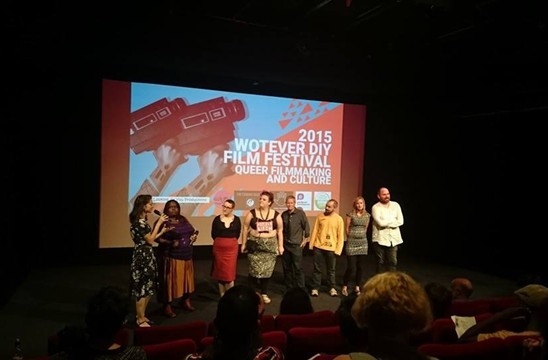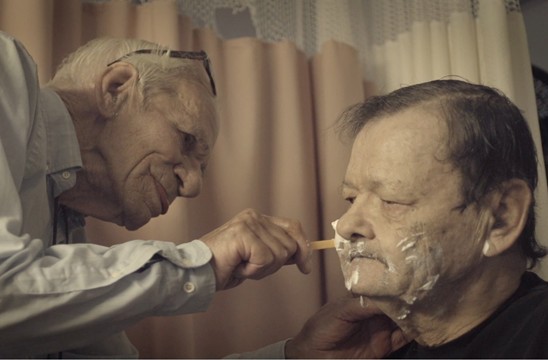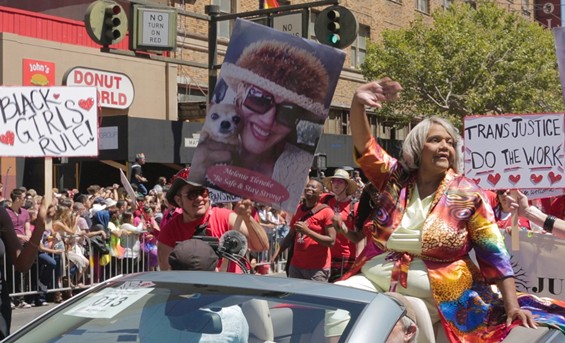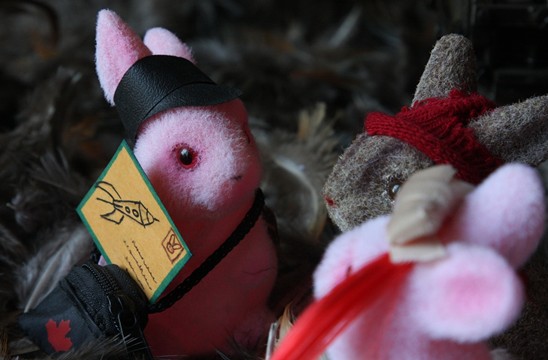For today’s guest post, Johan Palme from the Wotever DIY Film Festival shares some insight into how to better reach queer communities as an event organiser.
The Wotever DIY Film Festival (WDIYFF) is a film festival for zero budget and low budget queer film, connecting with a uniquely diverse and multifaceted LGBTQ audience centred around South London. The festival has been running since 2012 and has built a very tight bond with the queer filmmaking community in the process. This year’s event, at the DIY Space for London on 3-4 September, promises to be the biggest so far with upwards of 70 short films and four feature films screening over two days alongside workshops and parties.
Wotever World, the community group behind the festival, has several decades of experience arranging major cabaret events where the whole queer community form both the performers and the audience, in particular working with otherwise often marginalised groups like lesbian and bisexual women, transgender people, queer people with disabilities and queer people of colour.
So. You’ve put on an event for us queer people. You’ve printed a rainbow flyer with a sparkly unicorn. You’ve written in all the right Facebook groups. And yet very few of us turn up, and you just cant fathom why.
The thing is, for people in the queer community itself, the factors that cause events like this to fail are not actually that mysterious. One of the reasons we put on film festivals like Wotever DIY Film Festival is precisely because we’ve seen and experienced how a lot of events are fundamentally flawed, and believe we can do things differently.
Despite that, of course, there’s nothing wed rather see than every film festival successfully adopt a queer perspective and show amazing queer films. To that end, this article contains five types of things that can go wrong with LGBTQ screenings – but also, crucially, tips for how to avoid them.
1. Don’t make us a symbol or a token
Supporting the queer community has, in a relatively short period of time, become a fashionable thing. Using queer symbols – or queerness as a symbol – has become an advertising shorthand for progress and modernity, for youth and being with-it.
And yet, quite often, the commitment is only skin deep, consisting of little more than slapping a rainbow logo or a picture of kissing female models, and failing to actively tackle homophobia and discrimination in your own organisation, let alone in the wider world. In the queer community, we have a word for this kind of superficially queer-friendly marketing: pinkwashing. And trust me, we can smell it a mile away.

Nothing looks less convincing than a single queer film included in a programme that otherwise makes no effort to address a queer perspective, or a single queer person included in a panel discussion who is somehow meant to represent everyone in a large and diverse community.
If you’re including queer material because it looks good in the programme or because its ticking off a box on a diversity chart, you’re barking up the wrong tree. And no matter how strong your queer material is, if the rest of your programme is completely unreflecting and includes homophobia, transphobia and unpleasant stereotypes, the queer community is still likely to avoid you. (And yes, queer people do want to see the rest of your programme, too. Just because someone is queer doesn’t mean they only ever want to see queer films – nor do queer films necessarily only appeal to a queer audience. Giving those films just a token space tends to rather cement this divide.)
Why not have people from the queer community right from the beginning as part of the programming team? They can bring understanding and knowledge and mitigate a lot of these headaches. Which segues neatly into
2. Dont be ignorant
Another thing the queer community will immediately notice is when an event organiser hasn’t done their homework. As with any specific audience, actually trying to understand the audiences needs and concerns is something you really have to do with the queer community as well.

Using old-fashioned or derogatory language will actively scare queer people away. As will very stereotypical, simplistic depictions and tired old cliches. Just a few instances of not being able to anticipate the impact of a chosen word (or, say, an unfortunate poster image) can damage your reputation irrevocably.
And yet, the problems keep reappearing. We still see the same vapid, ill-prepared panel discussions with badly-chosen moderators who ask prejudiced questions. Programme copy is still rife with stereotypes. Trans people still get routinely misgendered.
Do a lot of reading up on any potential topic you intend to be covering. Follow erudite blogs like Black Girl Dangerous or The TransAdvocate. Or better yet: have a continual ear to the ground, that is
3. Don’t be an outsider
Being queer means facing a multitude of daily hazards and fears. Queer people are disproportionately targeted by street violence, sexual violence, workplace harassment and discrimination. So forgive us for being a naturally suspicious bunch, who need time in order to trust someone and who need spaces where we feel we can be safe.
If you want to reach the queer community and make them trust you, there’s no better way than to actually make yourself substantially part of it. Make and keep up contacts with a network of queer filmmakers. Be present, wholeheartedly and not just to market yourself, at community events. Do so continuously. You’ll probably find the queer community a welcoming bunch, even if you’re straight or cis-gendered – as a small minority we rely on the support of the allies around us, and there are few events where you turning up and listening respectfully would not be encouraged.
Consult with the community during the planning phase as well. Be prepared to change your content if need be – a consultation process is not just for show. If someone helps you out in an expert capacity, reimburse them as you would your printer any other outside contractor; don’t automatically expect anyone to work for free.
Receive anyone who comes to you with an initiative with open arms. Being open to all comers has been a crucial part of our success at WDIYFF and our other events – saying yes to almost anything may lead to variable quality, but the freshest, best and most daring will flock to you. Let the queer community think up its own events and collaborations, and spread the word that you welcome us doing so.
And we mean the whole queer community, so…

4. Don’t exclude people
The queer community is incredibly diverse; it isn’t one monolithic thing. Direct yourself towards only parts of it at your peril. Reaching some subgroups will always be easy, but remember, the queer community has strong internal ties and excluding some people will likely mean their friends go elsewhere as well.
Featuring only white, cisgendered, university educated gay men in your events and marketing materials is easy enough to do – theyre generally people with a significant voice already and easy to find, articulate in politically correct language and moving in the same circles as festival directors tend to do.
But marginalised voices in the community are equally important. Make a conscious effort to support the expression of queer people of colour, trans people, bisexuals, lesbians and queers with disabilities. For the latter, accessibility is vital. Strive to include wheelchair access, BSL interpretation and audiovisual interpretation in as many contexts as you can. Provide comfortable seating. Understand the needs of neuroatypical people on the autism spectrum or with ADHD, and try to include features like a quiet room if you have space.
Queer people are also disproportionately affected by depression, anxiety and other psychological issues, and understanding how films can trigger symptoms is exceedingly good practice.
Finally, remember that the more marginal parts of the queer community are more likely to be unemployed and have little money. Offering a differentiated price structure is a good start.
And most important of all…

5. Don’t be homogeneously hegemonic
If the statistics of the UK arts world bear out in practice, its highly likely that whoever runs your festival or cinema is white, straight, cis-gendered, university educated and middle-class. So does it surprise you, then, that your audience is also white, straight, cis-gendered, university educated and middle-class?
All other factors really pale in comparison to this, and deep down, you know that. As long as the most privileged groups in society subscribe to all important positions of power in the arts world, the arts world will struggle with reaching marginalised groups. Its not rocket science.
The thing is, though, its also the one which a lot of people find the most challenging to do something about. Because it means actually giving up hard-fought personal positions of power. It means, very likely, that you’ll have replace trusted friends and colleagues. It means having to let people that think very differently to you have as much say as you, maybe more. It might even mean resigning, or demoting yourself.
Call it a litmus test for how serious you are about inclusivity. Will you include people from marginalised groups at the heart of your organisation, offering real, well-paid jobs and real decision-making power? Even at the expense of yourself? If not, perhaps you’re not really trying.

